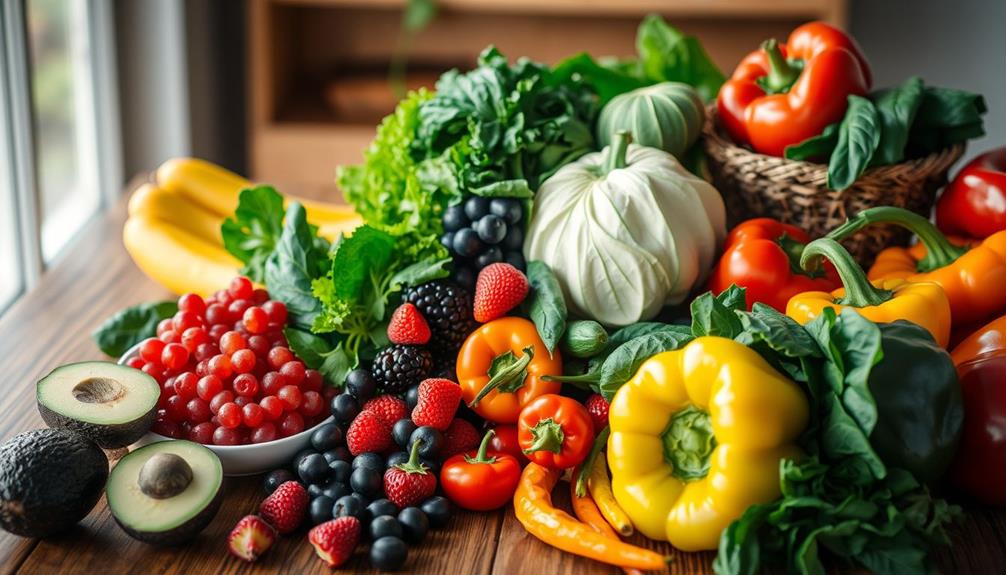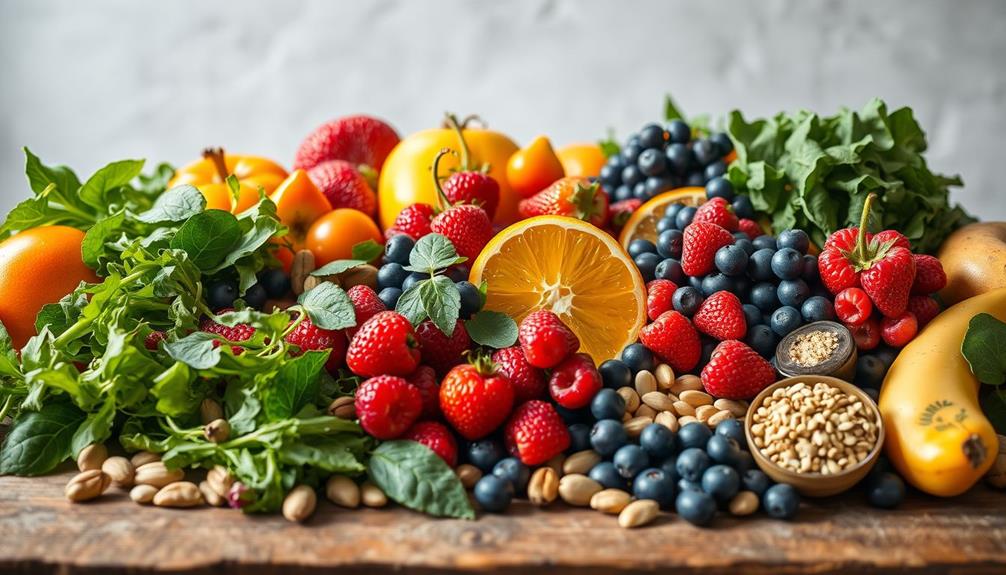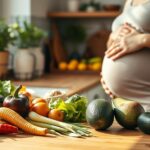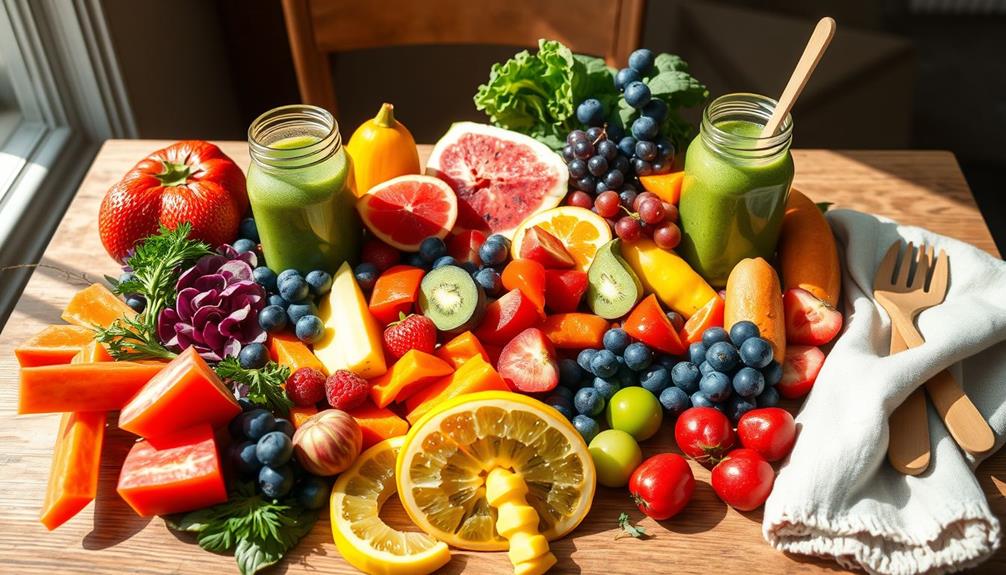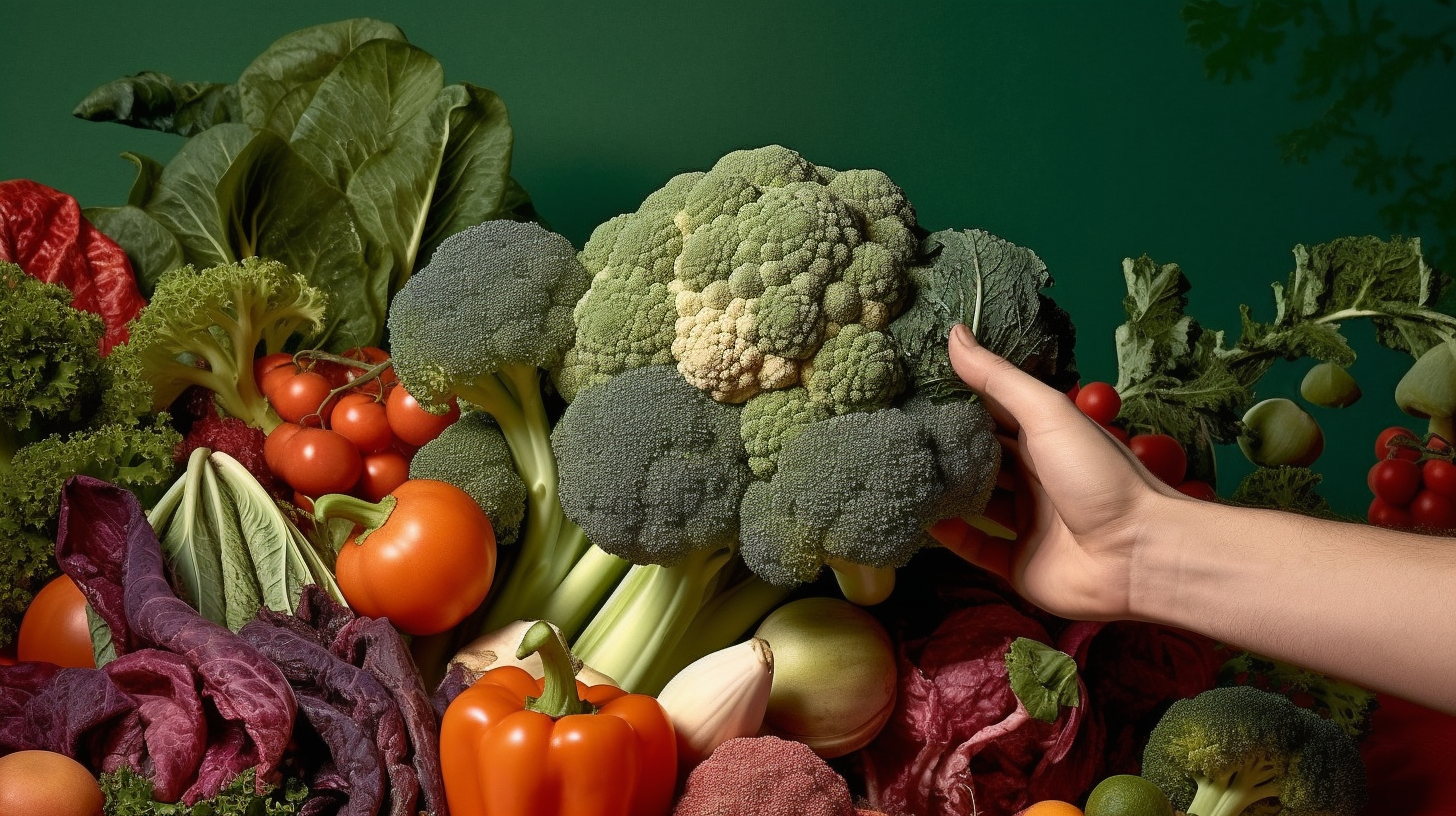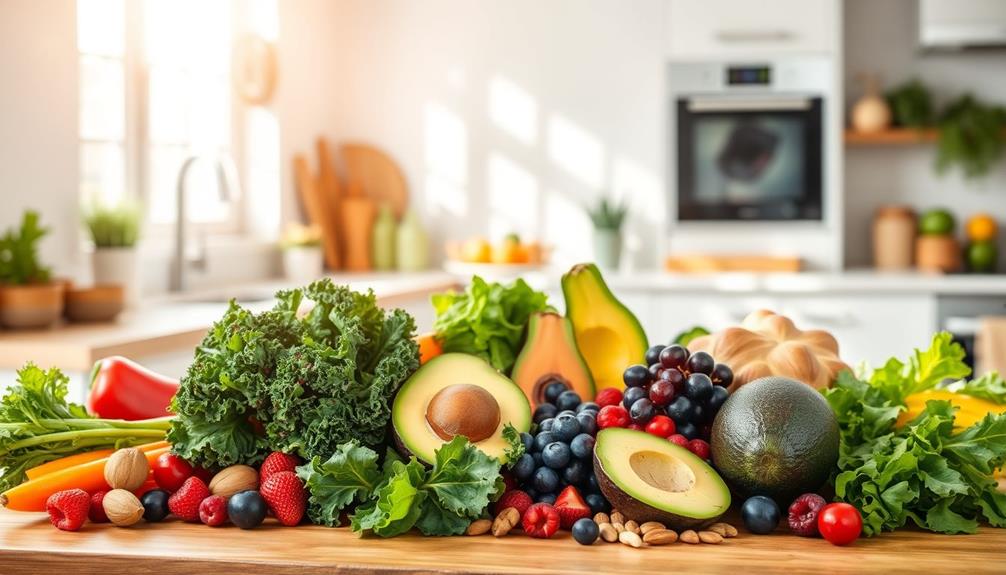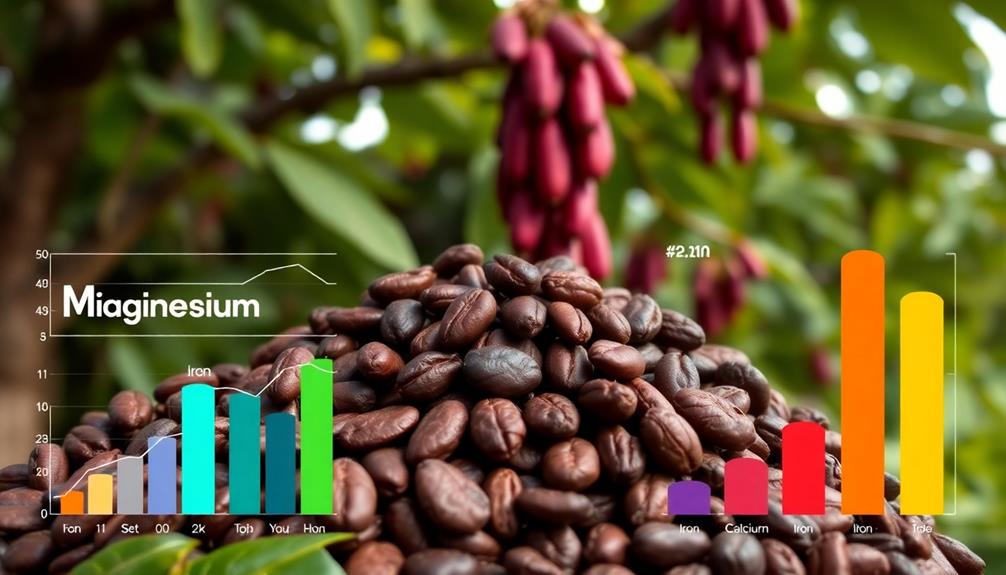You shouldn't eat raw food while pregnant due to serious health risks. Raw meats, sushi, and unpasteurized dairy can contain harmful bacteria that may lead to infections like Listeriosis or Salmonellosis. These infections can endanger both you and your baby, causing complications such as miscarriage or developmental delays. It's important to avoid undercooked seafood and meats, and prioritize safe food practices. Always cook foods to recommended temperatures and maintain hygiene to minimize risks. To promote a healthy pregnancy, you might want to explore safe alternatives and get expert guidance tailored to your nutritional needs. When grocery shopping, be sure to look for labels indicating that the food is pasteurized, and avoid products that contain raw or undercooked ingredients. Additionally, consider seeking advice from a healthcare professional or a nutritionist to ensure that your diet is meeting all the necessary nutritional requirements while minimizing raw food risks. By being mindful of your food choices and following safe cooking practices, you can reduce the likelihood of encountering any complications related to consuming raw foods during pregnancy.
Key Takeaways
- Avoid raw seafood, undercooked meats, and unpasteurized dairy products due to high risks of harmful bacteria and parasites during pregnancy.
- Food poisoning can lead to severe complications such as miscarriage, stillbirth, and long-term effects on fetal health.
- Maintain strict food safety practices, including thorough washing and cooking to proper temperatures, to minimize risks.
- Consult healthcare providers for guidance on safe food options and to address any concerns regarding nutrition during pregnancy.
- Prioritize a balanced diet with cooked foods to support maternal and fetal health while avoiding high-risk raw items.
Risks of Raw Foods
When you're pregnant, consuming raw foods can pose significant risks to both you and your developing baby. Raw foods, such as undercooked meat, sushi, and shellfish, can harbor harmful bacteria and parasites, increasing your likelihood of food poisoning. Infections like Listeriosis and Salmonellosis are particularly concerning for pregnant women because they can lead to severe complications.
Additionally, pregnant women should be cautious about their overall nutrition and health, as certain dietary choices can affect both maternal and fetal well-being; for instance, gout nutrition guidelines can provide insight into maintaining a balanced diet.
The first trimester is vital; your baby's immune system is still developing, making exposure to foodborne pathogens even more dangerous. Pregnant women often experience changes in their gut microbiome and immune system suppression, which means even asymptomatic infections can be harmful. This heightened vulnerability suggests that it's best to avoid raw foods entirely during your pregnancy.
Raw seafood is especially risky, as it may contain bacteria and parasites that can cause severe illness. Unpasteurized dairy products also pose a threat, so it's wise to skip these as well.
Consequences of Food Poisoning
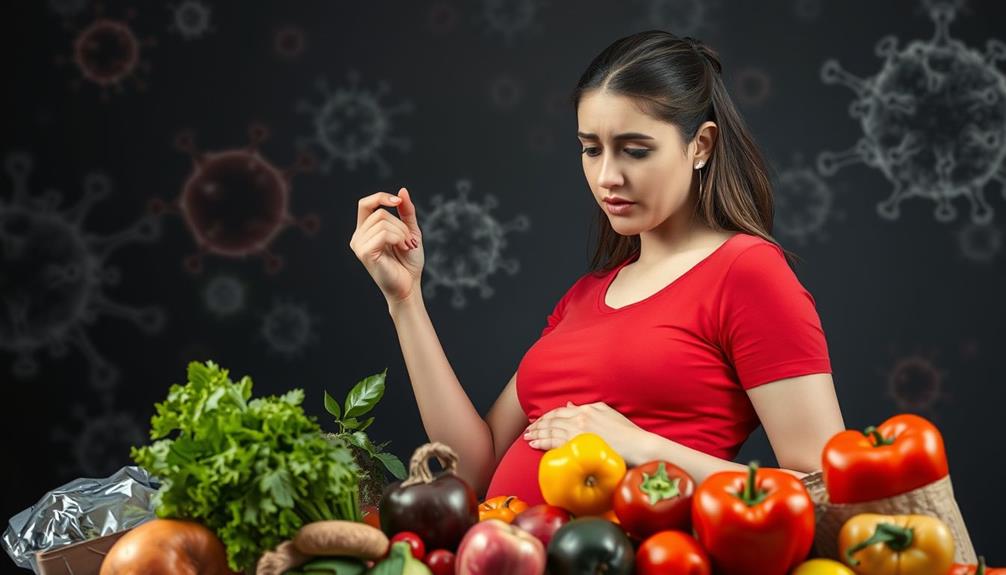
Food poisoning during pregnancy can pose serious risks to your baby's health, potentially leading to complications like miscarriage or stillbirth.
The significance of early detection and treatment of foodborne illnesses can't be overstated, as it guarantees the safety of both mother and child.
If you experience symptoms like fever, diarrhea, or nausea, it could mean your body is struggling, and dehydration may require medical attention.
Prioritizing food safety is vital to protect both you and your growing child, especially considering the risks associated with mammography guidelines.
Fetal Health Risks
The dangers of food poisoning during pregnancy can have profound effects on fetal health. Consuming raw foods greatly increases your risk of severe infections like Listeriosis and Salmonellosis, which can lead to serious fetal health risks, including miscarriage or stillbirth.
Financial considerations for elderly care highlight the importance of understanding health impacts, as toxins from foodborne illnesses can enter your bloodstream, jeopardizing both your health and your developing baby's.
Infections from contaminated food may not always show symptoms in you, but they can have catastrophic consequences for your unborn child. For instance, Listeria and Salmonella can cause complications such as preterm labor, developmental delays, and even intellectual disabilities in newborns.
It's essential to guarantee that what you eat is safe; maintaining proper internal temperatures in cooked foods can help minimize these risks.
The potential for hospitalization due to severe food poisoning is another concern, as dehydration can complicate your pregnancy. You want to provide the best environment for your baby, so be cautious about what you consume.
Avoiding raw foods is a smart way to protect against these harmful effects and guarantee a healthy pregnancy.
Maternal Symptoms and Effects
Experiencing food poisoning during pregnancy can lead to a range of distressing maternal symptoms that greatly impact your overall health. Common pathogens like Listeria and Salmonella, often found in raw foods, can enter your bloodstream, increasing the risks for both you and your developing fetus. Pregnant women are particularly vulnerable to infections due to immune system suppression, making food safety vital during this time.
Here's a quick overview of possible symptoms and their consequences:
| Symptoms | Consequences |
|---|---|
| Fever | Dehydration and potential hospitalization |
| Diarrhea | Nutritional deficiencies |
| Vomiting | Increased risk of miscarriage or stillbirth (rare) |
If you face any of these symptoms, seek health care immediately. Severe food poisoning in the first trimester of pregnancy can lead to long-term effects on your newborn, including intellectual disabilities. Remember, avoiding high levels of mercury in raw fish and prioritizing food safety is essential for your well-being and your baby's health.
Food Safety Precautions
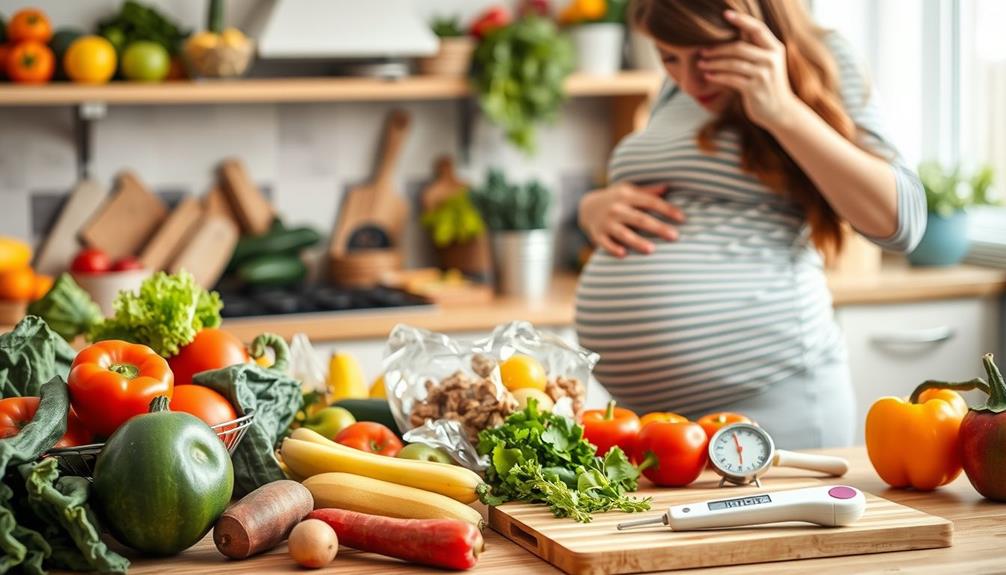
When preparing raw food while pregnant, it's essential to prioritize food safety. Always wash your hands and surfaces thoroughly to avoid cross-contamination, and use separate cutting boards for raw and ready-to-eat items.
Confirming proper hygiene is key, as improper food handling can lead to harmful bacteria that may affect both you and your baby.
Additionally, consider the importance of a balanced diet, similar to proper hamster care, which emphasizes nutritious food choices.
Also, verify that any pre-cooked foods are heated to safe temperatures to protect both you and your baby.
Safe Food Preparation
Safe food preparation is essential for anyone, especially pregnant women, to avoid foodborne illnesses that can harm both mother and baby. Start by washing your hands, utensils, and surfaces thoroughly before preparing food. This helps reduce the risk of contamination.
When handling raw foods, use separate cutting boards for raw meats and ready-to-eat items to prevent cross-contamination. Additionally, consider using vital oils like eucalyptus oil for their antimicrobial properties to further support your health during this time.
When cooking, verify that you reheat all food to a safe internal temperature of at least 60°C (140°F) to eliminate harmful bacteria. It's important to maintain proper food temperatures; keep hot food above 60°C and cold food below 4°C to inhibit bacterial growth.
Also, remember the two-hour rule for leftovers—consume them within two hours of cooking to prevent food poisoning.
While raw foods may be tempting, it's wise to avoid them during pregnancy. The risks of foodborne illness are higher, and your immune system is more vulnerable.
Avoiding Cross-Contamination
Cross-contamination is a major concern in food safety, especially for pregnant women.
It's essential to take precautions when handling food to avoid potential risks. When you're pregnant, your immune system is more vulnerable, making it even more important to prevent contamination from raw and undercooked foods.
Additionally, maintaining a balanced diet is vital during pregnancy, so understanding how to manage food safety can contribute to overall health, similar to how budgeting is key for financial wellness.
Here are three key steps to help you avoid cross-contamination:
- Wash Everything: Always wash your hands, utensils, and surfaces thoroughly before food preparation. This helps eliminate bacteria and viruses that could pose a risk to you and your baby.
- Use Separate Cutting Boards: Keep separate cutting boards for raw meats and ready-to-eat foods. This practice minimizes the transfer of harmful pathogens that can lead to foodborne illnesses.
- Follow the Two-Hour Rule: Don't leave perishable foods out for more than two hours. If you're unsure, refrigerate leftovers promptly to reduce contamination risks.
Consult your healthcare provider for specific foods to avoid during pregnancy.
Proper Cooking Temperatures
Understanding proper cooking temperatures is essential for ensuring the safety of the food you eat during pregnancy. Cooking foods to the right internal temperature helps protect you and your baby from harmful bacteria and foodborne illnesses.
For whole cuts of meat, aim for a minimum internal temperature of 145°F (63°C); ground meats should reach 160°F (71°C), while poultry needs to be cooked to 165°F (74°C). Additionally, maintaining a balanced diet rich in fruits and vegetables can further support your health during this time.
When it comes to seafood, remember that it should also be cooked to an internal temperature of 145°F (63°C). Avoid raw or undercooked shellfish, as they pose a high risk of foodborne illnesses.
Raw eggs can contain Salmonella, so skip them unless they're pasteurized; use pasteurized eggs for homemade dressings and desserts.
Deli meats and hot dogs aren't safe during pregnancy unless they're reheated until steaming hot, reaching 165°F (74°C), to kill any potential Listeria bacteria.
Always use a food thermometer to accurately check internal cooking temperatures. By following these guidelines, you can enjoy your meals while keeping you and your baby safe.
Guidelines for Raw Food Consumption
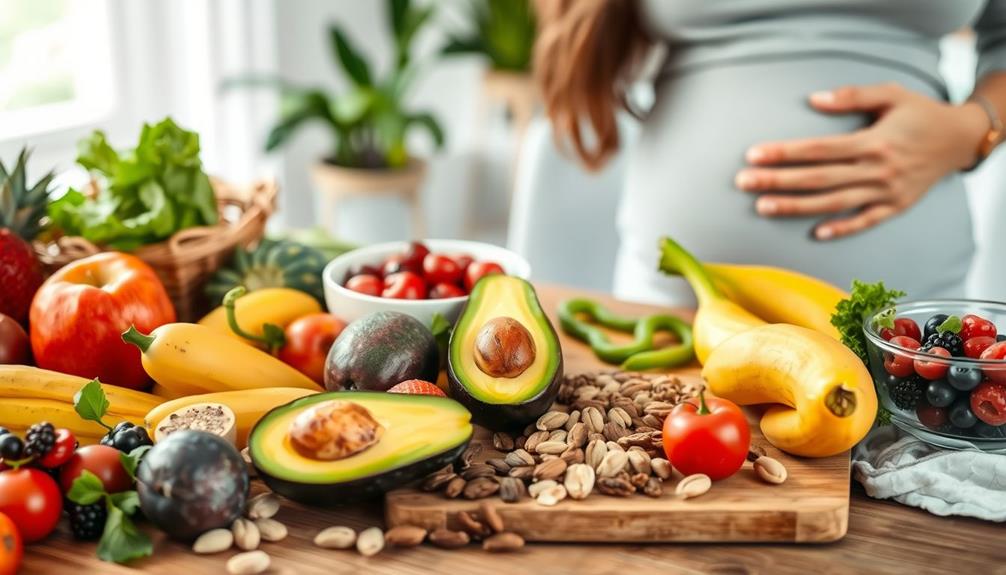
Maneuvering the world of raw food consumption during pregnancy requires careful consideration and diligence to guarantee both your health and that of your baby.
Most pregnant women are advised to avoid raw foods, especially in the first trimester, due to the heightened risk of food poisoning that can affect both mother and fetus. This risk is particularly concerning with certain foods that can harbor harmful pathogens, such as raw seafood or unpasteurized dairy, which are best avoided.
If you're considering raw foods after the first trimester, consult with your healthcare provider for tailored advice to secure food safety.
Here are some guidelines to keep in mind:
- Be cautious with raw seafood: Avoid sushi or oysters, as they can harbor harmful pathogens.
- Skip unpasteurized dairy products: Stick to pasteurized options to reduce the risk of Listeria.
- Practice strict food safety: Confirm proper washing and handling of all raw foods to minimize contamination.
While some semi-cooked foods might be deemed safe with medical guidance, it's vital to prioritize food safety practices.
Always remember that your health and your baby's well-being come first—make informed choices about what you eat during this significant time.
Foods to Avoid During Pregnancy
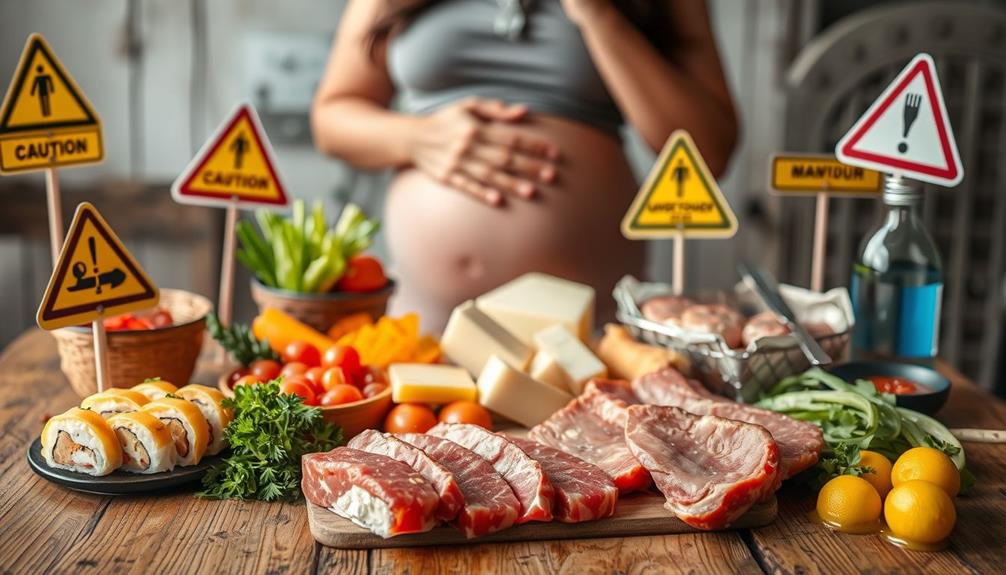
When it comes to maintaining a healthy pregnancy, knowing which foods to avoid is vital for your and your baby's safety. Individuals with certain psychological conditions, like Borderline Personality Disorder (BPD), may experience heightened emotional responses that can impact dietary choices during pregnancy.
You should steer clear of raw meats, as they can harbor harmful bacteria like E. coli and Toxoplasmosis, increasing the risk of serious infections. Raw eggs also pose a risk of Salmonella contamination, so it's best to avoid any foods containing raw or lightly cooked eggs, such as homemade dressings and desserts.
Additionally, sushi made with raw fish can contain pathogens like Vibrio, which may lead to foodborne illnesses. Opt for fully cooked seafood options instead.
Unpasteurized dairy products, including certain soft cheeses, should be avoided due to the risk of Listeria infection, which can severely impact your fetus's health.
Don't forget about fresh produce; raw sprouts and unwashed fruits and vegetables can carry harmful pathogens. Thoroughly cleaning or avoiding these foods during pregnancy is imperative for your well-being.
Nutritional Needs and Prenatal Care
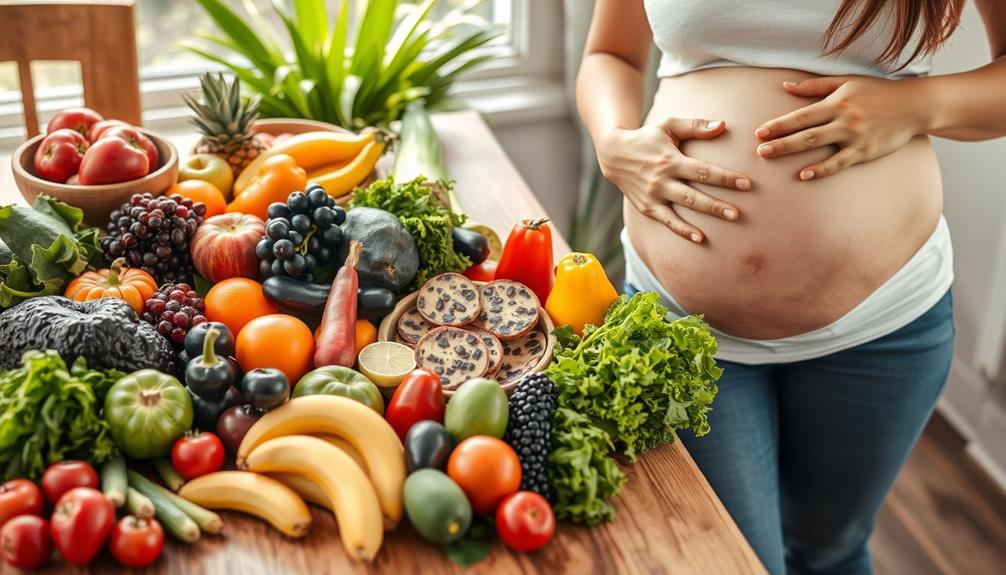
Maintaining a healthy pregnancy goes beyond knowing what to avoid; it also involves meeting your nutritional needs. A balanced diet is essential, especially if you're considering raw foods. While some raw foods can be safe, it's important to prioritize your health and your baby's.
Including a variety of nutrient-rich foods can help guarantee you're getting the vitamins and minerals needed for a healthy pregnancy, similar to how herbal teas can support women's health during menstruation.
Here are three key aspects to focus on:
- Diverse Diet: Include a variety of fruits, vegetables, lean proteins, and dairy to make sure you get necessary nutrients. This helps support healthy weight gain and overall well-being.
- Prenatal Vitamins: Don't skip your prenatal care appointments. Prenatal vitamins, especially those with folic acid, are crucial for preventing neural tube defects and safeguarding maternal and fetal health. Iron supplements may also be necessary as your body requires higher levels during pregnancy to prevent anemia.
- Monitor Weight Gain: It's important to focus on healthy weight gain tailored to your individual health needs. Avoiding weight loss during this time is vital for both you and your baby.
Frequently Asked Questions
What Happens if You Accidentally Eat Something Raw While Pregnant?
If you accidentally eat something raw while pregnant, stay calm. Don't induce vomiting; it could worsen things. Contact your healthcare provider for advice, and monitor for any symptoms like fever or stomach cramps.
Can You Eat Raw Food When Trying to Get Pregnant?
You might think raw food's healthy, but it can pose serious risks when trying to conceive. It's best to avoid raw meats and seafood, focusing instead on safe, nutrient-rich foods to support your reproductive health.
Why Is Raw Not Allowed for Pregnant?
Raw foods aren't recommended during pregnancy due to risks like harmful bacteria and parasites. These can seriously affect both you and your developing baby, leading to severe health issues or complications. It's best to avoid them.
How Do You Handle Raw Meat When Pregnant?
Handling raw meat's like maneuvering through a minefield; you've got to be careful. Always cook it to safe temperatures, use separate cutting boards, and wash your hands thoroughly to prevent any foodborne illnesses. Stay safe!
Conclusion
In the delicate dance of pregnancy, your health and your baby's well-being take center stage. While the vibrancy of raw foods might tempt you, remember the lurking dangers hidden within. Picture the bright colors of fresh produce, but don't forget the shadows of potential foodborne illnesses. Prioritize safety and nourishment, savoring cooked delights that nourish both you and your little one. Embrace this journey with care, making choices that wrap you both in a protective, nurturing embrace.

